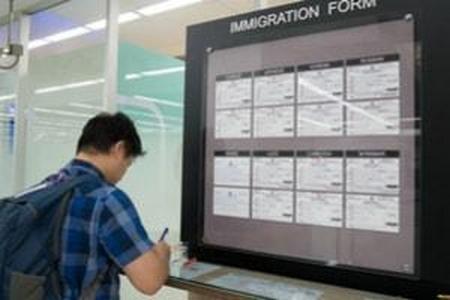Accommodations and Exemptions at Naturalization Interviews
 Many immigrants who have lived in the U.S. for years make the decision to become naturalized citizens. In order to naturalize, a person must go through an interview in addition to submitting an application and documentation. However, some applicants are not able to meet the criteria and accommodations must be sought. If you are disabled or otherwise unable to meet one of the requirements for the interview, there is a procedure that must be followed.
Many immigrants who have lived in the U.S. for years make the decision to become naturalized citizens. In order to naturalize, a person must go through an interview in addition to submitting an application and documentation. However, some applicants are not able to meet the criteria and accommodations must be sought. If you are disabled or otherwise unable to meet one of the requirements for the interview, there is a procedure that must be followed.
General Accommodations & Exceptions
While age or other certain conditions are not considered disabilities, per se, it is possible sometimes to seek accommodation for an elderly applicant or for someone who has another condition that may not rise to the level of medical disability.
Age is perhaps the most common reason why people seek accommodation, and U.S. Citizenship & Immigration Services (USCIS) does grant certain exemptions and workarounds to the elderly. For example, if a person is over the age of 50 and has lived in the U.S. as a permanent resident for 20 years or more, then he or she is exempt from taking the otherwise-required English language tests.
Illiteracy is another condition that may create a problem during a naturalization interview, though the law specifically does not grant accommodations based solely on illiteracy. One of the requirements for naturalization is to be able to read, write, and speak English, absent a medical exemption. If someone cannot read English, he or she is simply deemed to have failed that particular section of the interview.
Disability Accommodations & Exemptions
USCIS personnel are required to follow the law in conducting interviews, including the granting of accommodations that might be required due to disability. The relevant section of law states that while most potential naturalization candidates must demonstrate proficiency in the English language and in general civics, the requirements do not apply to anyone who can show a “medically determinable physical or mental impairment” or combination of impairments that is expected to last at least 12 months. “Medically determinable” is defined as a diagnosis that is arrived at using standard laboratory or clinical techniques.
The important factor to keep in mind is that while an exemption to the criteria may not be forthcoming, depending on the situation, but accommodations may still be obtainable. For example, a sign language interpreter or additional testing time may be granted, even if the right to skip the interview entirely is not. USCIS personnel is not permitted to judge a disabled applicant differently than an able applicant, and if there is grounds to believe that this has occurred, the applicant may have grounds for appeal.
Seek Experienced Legal Assistance
Someone who is seeking to become a naturalized citizen generally has a sincere wish to succeed, and a medical disability should not prevent him or her from doing so. If you have questions about naturalization or accommodations in the process, contacting a knowledgeable attorney can help. The dedicated Chicago-area naturalization attorneys at Mevorah & Giglio Law Offices have experience in these cases, and are happy to try and help you with yours. Call our office today to set up a free consultation.
 English,
English,
 Spanish,
Spanish,
 Polish,
Polish,
 Urdu
Urdu













 Make a Payment
Make a Payment



